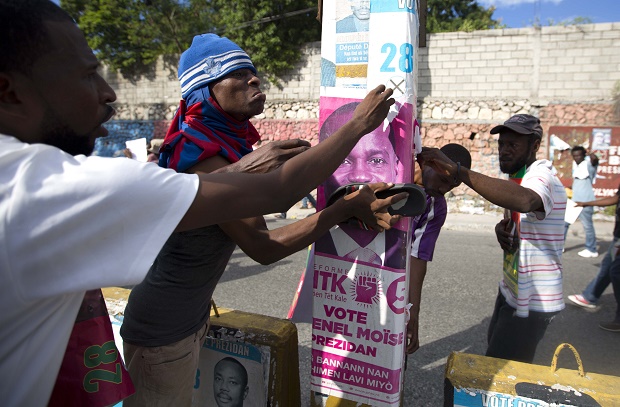
Supporters of presidential candidate Moise Jean-Charles take off campaign posters of candidate Jovenel Moise during a protest against official preliminary election results announced by the Electoral Council in Port-au-Prince, Haiti, Friday Nov. 6, 2015. Jude Celestin, a former state construction chief, and government-backed candidate Jovenel Moise, appear to be advancing to a runoff election for Haiti’s presidency, according to preliminary results announced Thursday. AP
PORT-AU-PRINCE, Haiti — The top finisher in last month’s first-round presidential voting already refers to himself as Haiti’s leader while the No. 2 vote-getter is contesting preliminary results he says were tainted by fraud and don’t reflect the will of voters.
There was a sharp contrast in tone and message Friday between government-backed candidate Jovenel Moise and former state construction chief Jude Celestin. A preliminary tally released by Haiti’s Provisional Electoral Council put them at the top of the 54-candidate field, setting up a late December runoff between the two businessmen.
Leading candidate Moise was largely celebratory, expressing gratitude to voters while referring to himself as “the president of all Haitians” at an upscale hotel in a hillside suburb of Port-au-Prince. Electoral authorities say the agricultural entrepreneur hand-picked as President Michel Martelly’s successor got 32.8 percent of the valid votes cast on Oct. 25.
Celestin was far more austere at an unadorned office of his political faction called Lapeh, or “Peace,” denouncing alleged widespread fraud and accusing the Provisional Electoral Council of acting “undemocratically.” He got 25.2 percent in the official tally, trailing Moise by 117,602 votes.
He told reporters he is working to create a coalition of other presidential candidates who assert the recent elections and ballot-counting process was too problematic for the preliminary count to be legitimate.
“We are working on this with all the candidates because we are all saying the same thing: ‘This is not the people’s vote and they are trying to steal the vote of the population,'” Celestin said of the planned coalition.
READ: Polarized Haiti votes in tense presidential election
Celestin was the government-backed candidate in the previous presidential election. Disputed preliminary results showed Celestin edging out Martelly for one of two spots in a runoff ballot, but under international pressure Haiti’s electoral authorities reviewed the count and eliminated Celestin from the race.
On Friday, throngs of Celestin’s supporters marched through neighborhoods of the capital, criticizing electoral authorities. When the crowd grew to roughly 2,000 people, police fired water cannons and tear gas to disperse them.
Police also broke up demonstrations by supporters of the third-place finisher, ex-senator Moise Jean-Charles of the Petit Dessalines faction, and backers of the fourth-place finisher, Maryse Narcisse of the Fanmi Lavalas party founded by ex-President Jean Bertrand Aristide.
On Friday afternoon, the electoral observation mission of the Organization of the American States said the preliminary results issued Thursday by Haitian electoral authorities “are consistent with what the OAS mission observed” on election day.
The OAS mission, which had 125 observers in Haiti during the vote, urged “the competent authorities to investigate the allegations of irregularities that have been presented and to sanction any actions prohibited by law.”
The preliminary results announced Thursday were immediately questioned by a broad array of political factions and Haitian observers. Gunshots rang out that evening in some neighborhoods and a supporter of Jean-Charles was fatally shot in Port-au-Prince.
Turnout on Oct. 25 had been relatively low: Just over 1.5 million people cast ballots out of roughly 5.8 million registered voters.
Much of the concern about fraud centered around the involvement of political party representatives who were issued accreditation cards by the electoral council. Haitian nonprofit National Human Rights Defense Network said there was a thriving black market for the council’s accreditation cards, which equaled more than half of the voters who cast ballots. The cards gave holders access to polling stations and the suspicion is that it allowed many to engage in fraudulent acts.